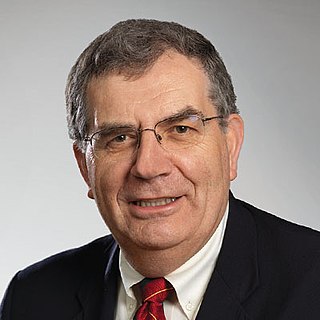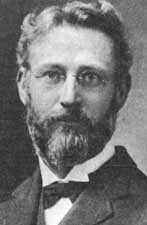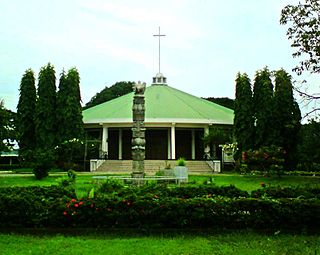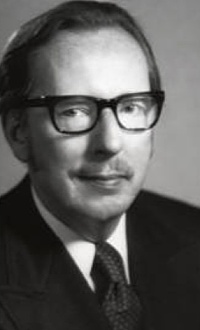
Benjamin Breckinridge Warfield was professor of theology at Princeton Seminary from 1887 to 1921. He served as the last principal of the Princeton Theological Seminary from 1886 to 1902. After the death of Warfield in office, Francis Landey Patton took over the functions of the office as the first president of seminary. Some conservative Presbyterians consider him to be the last of the great Princeton theologians before the split in 1929 that formed Westminster Theological Seminary and the Orthodox Presbyterian Church.

Archibald Alexander was an American Presbyterian theologian and professor at the Princeton Theological Seminary. He served for 9 years as the President of Hampden–Sydney College in Virginia and for 39 years as Princeton Theological Seminary's first professor from 1812 to 1851.

Princeton Theological Seminary (PTSem), officially The Theological Seminary of the Presbyterian Church, is a private school of theology in Princeton, New Jersey. Founded in 1812 under the auspices of Archibald Alexander, the General Assembly of the Presbyterian Church (USA), and the College of New Jersey, it is the second-oldest seminary in the United States. It is also the largest of ten seminaries associated with the Presbyterian Church.
Edmund Prosper Clowney was a theologian, educator, and pastor.

Sinclair Buchanan Ferguson is a Scottish theologian known in Reformed Christian circles for his teaching, writing, and editorial work. He has been Chancellor's Professor of Systematic Theology at Reformed Theological Seminary since 2017, commuting from Scotland, where he was an assistant minister at St. Peter's Free Church of Scotland, Dundee. He is currently a preaching associate at Trinity Church, Aberdeen

Covenant Theological Seminary, informally called Covenant Seminary, is the denominational seminary of the Presbyterian Church in America (PCA). Located in Creve Coeur, Missouri, it trains people to work as leaders in church positions and elsewhere, especially as pastors, missionaries, and counselors. It does not require all students to be members of the PCA, but it is bound to promote the teachings of its denomination. Faculty must subscribe to the system of biblical doctrine outlined in the Westminster Standards.

Geerhardus Johannes Vos was a Dutch-American Calvinist theologian and one of the most distinguished representatives of the Princeton Theology. He is sometimes called the father of Reformed Biblical Theology.

The fundamentalist–modernist controversy is a major schism that originated in the 1920s and 1930s within the Presbyterian Church in the United States of America. At issue were foundational disputes about the role of Christianity; the authority of the Bible; and the death, resurrection, and atoning sacrifice of Jesus Christ. Two broad factions within Protestantism emerged: fundamentalists, who insisted upon the timeless validity of each doctrine of Christian orthodoxy; and modernists, who advocated a conscious adaptation of the Christian faith in response to the new scientific discoveries and moral pressures of the age. At first, the schism was limited to Reformed churches and centered around the Princeton Theological Seminary which had fundamentalist faculty members found Westminster Theological Seminary when Princeton went in a liberal direction. However, it soon spread, affecting nearly every Protestant denomination in the United States. Denominations that were not initially affected, such as the Lutheran churches, eventually were embroiled in the controversy, leading to a schism in the United States.
Clarence Edward Noble McCartney was a prominent conservative Presbyterian pastor and author. With J. Gresham Machen, he was one of the main leaders of the conservatives during the Fundamentalist–Modernist Controversy in the Presbyterian Church in the United States of America.

Lewis Sperry Chafer was an American theologian. He co-founded Dallas Theological Seminary with his older brother Rollin Thomas Chafer (1868-1940), served as its first president, and was an influential proponent of Christian Dispensationalism in the early 20th century. John Hannah described Chafer as a visionary Bible teacher, a minister of the gospel, a man of prayer with strong piety. One of his students, Charles Caldwell Ryrie, who went on to become a world renowned theologian and scholar, stated that Chafer was an evangelist who was also "an eminent theologian."

Samuel Miller was a Presbyterian theologian who taught at Princeton Theological Seminary.
James Franklin Kay is the Joe R. Engle Professor of Homiletics and Liturgics Emeritus, and Dean and Vice President of Academic Affairs Emeritus at Princeton Theological Seminary.
Frederick Dale Bruner is an American biblical scholar.

Union Theological Seminary is the oldest Protestant seminary in the Philippines.
Charles Jahleel Woodbridge was an American Presbyterian missionary, minister, seminary professor, founding member of the National Association of Evangelicals, and author of The New Evangelicalism.
Hughes Oliphant Old was an American theologian and academic. Until his retirement in 2014 he was the John H. Leith Professor of Reformed Theology and Worship at Erskine Theological Seminary. Previously he had taught at Princeton Theological Seminary.
Rodger Nishioka is an American preacher, Seminary professor, and Christian educator. He currently serves as director of Adult Educational Ministries at Village Church in Prairie Village, Kansas. He was previously the Benton Family Associate Professor of Christian Education at Columbia Theological Seminary. Nishioka is noted for his work with young people and his reputation as a popular "keynoter" at inter-denominational Christian youth conferences.
The Presbyterian University and Theological Seminary (PUTS) is a university and seminary located in the Gwangjin District, Seoul, South Korea. PUTS is affiliated with the Presbyterian Church of Korea. Its school motto is ‘Pietatis et Scientia’: ‘Piety and Knowledge’.

Ernest T. Campbell was an American Presbyterian clergyman, theologian, and writer. He is most remembered as senior minister of New York City's prominent Riverside Church from 1968 to 1976. A native of New York City, Campbell previously served as minister at churches in Pennsylvania and the First Presbyterian Church of Ann Arbor, Michigan. After resigning from Riverside Church, he lectured at various seminaries including his alma mater, Princeton Theological Seminary, and was Professor of Homiletics at Garrett–Evangelical Theological Seminary between 1982 and 1989.















